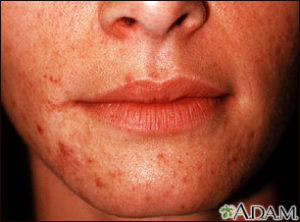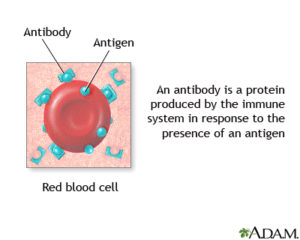Food allergy |
||
DefinitionA food allergy is type of immune response triggered by eggs, peanuts, milk, or some other specific food. Alternative NamesAllergy to food CausesMany people have a food intolerance. This term refers to heartburn, cramps, belly pain, or diarrhea that can occur after they eat foods such as:
A true food allergy is much less common. The immune system normally protects the body against harmful substances, such as bacteria and viruses. It also reacts to foreign substances called allergens. These are usually harmless and in most people do not cause a problem. In a person with a food allergy, the immune response is oversensitive. When it recognizes an allergen, the immune system launches a response. Chemicals such as histamines are released. These chemicals cause allergy symptoms. Any food can cause an allergic reaction. The most common food allergies are to:
In rare cases, food additives, such as dyes, thickeners, and preservatives, can cause a food allergy or intolerance reaction. Some people have an oral allergy. This is an allergy type syndrome that affects the mouth and tongue after they eat certain fresh fruits and vegetables:
SymptomsSymptoms usually begin within 2 hours after eating. Sometimes, the symptoms begin hours after eating the food. Key symptoms of a food allergy include hives, a hoarse voice, and wheezing. Other symptoms that may occur include:
Symptoms of mouth (oral) allergy syndrome:
In severe reactions, you may have low blood pressure and blocked airways. Exams and TestsBlood or skin tests are sometimes used to confirm that you have an allergy. A double-blind food challenge is one way to diagnose true food allergies. During this test, you and your health care provider will not know what you are eating. With elimination diets, you avoid the suspected food until your symptoms disappear. Then you start eating the foods again to see if you develop an allergic reaction. In provocation (challenge) testing, you eat a small amount of the suspected food under medical supervision. This type of test may cause severe allergic reactions. Challenge testing should only be done by a health care provider. Never try to cause a reaction or reintroduce a food on your own. These tests should only be done under the guidance of a health care provider, especially if your first reaction was severe. TreatmentIf you suspect that you or your child has a food allergy, see an allergy specialist doctor (allergist). Treatment may involve any of the following:
Other treatments, including allergy shots and probiotics, have not been proven to help with food allergies. If your child has a problem with cow’s milk formula, your provider may suggest trying a soy-based formula or something called an elemental formula, if it is available. If you have symptoms on only one area of the body, for example, a hive on the chin after eating the food, you may not need any treatment. The symptoms will likely go away in a brief time. Antihistamines may relieve the discomfort. Soothing skin creams may also provide some relief. If you have been diagnosed with a food allergy, learn how to use injectable epinephrine. You should have it with you at all times. If you develop any type of serious or whole-body reaction (even hives) after eating the food:
Support GroupsFood Allergy and Research and Education (FARE) — www.foodallergy.org Outlook (Prognosis)Many children outgrow their allergy to milk, egg, wheat, and soy by 5 years old if they avoid that food when they are young. Allergies to peanuts, tree nuts, and shellfish tend to last a lifetime. Avoiding the problem foods may be easy if the food is uncommon or easy to identify. When eating away from home, ask detailed questions about the food you are served. When buying food, read package ingredients carefully. Possible ComplicationsAnaphylaxis is a severe, whole-body allergic reaction that is life threatening. Although people with oral allergy syndrome may have an anaphylactic reaction in rare cases, they should ask their doctor if they need to carry injectable epinephrine. Food allergies can trigger or worsen asthma, eczema, or other disorders. When to Contact a Medical Professional
PreventionBreastfeeding may help prevent allergies. Otherwise, there is no known way to prevent food allergies except to delay introducing allergy-causing foods to infants until their gastrointestinal tract has had a chance to mature. The timing for this varies from food to food and from baby to baby. Once an allergy has developed, carefully avoiding the offending food usually prevents further problems. ReferencesBohl B. Food allergy. In: Rich RR, Fleisher TA, Shearer WT, et al, eds. Clinical Immunology. 4th ed. Philadelphia, PA: Elsevier; 2013:chap 43. NIAID-sponsored expert panel, Boyce JA, Assa’ad A, et al. Guidelines for the Diagnosis and Management of Food Allergy in the United States: Report of the NIAID-Sponsored Expert Panel. J Allergy Clin Immunol. 2010;126 (6 Suppl):S1-S58. PMID: 21134576 www.ncbi.nlm.nih.gov/pubmed/21134576. Sicherer SH, Lack G, Jones SM. Food allergy management. In: Adkinson NF Jr., Bochner BS, Burks AW, et al, eds. In: Middleton’s Allergy Principles and Practice. 8th ed. Philadelphia, PA: Elsevier Mosby; 2013:chap 84. |


